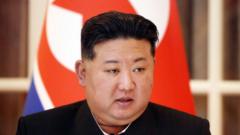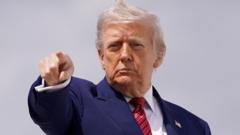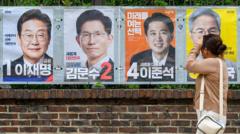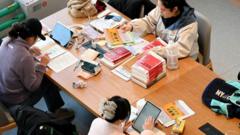As South Korea prepares for its snap presidential election on June 3rd, the nation seeks a leader to heal wounds from former President Yoon Suk Yeol's controversial martial law declaration, which led to political upheaval and unrest. With a backdrop of challenges, candidates are emerging amid a landscape of contrasting visions for the future of the country.
South Korea's Snap Presidential Election: Key Insights Ahead of June 3rd

South Korea's Snap Presidential Election: Key Insights Ahead of June 3rd
Upcoming election follows controversial leadership, shaping national future and global relations.
The upcoming snap election in South Korea, set for June 3rd, is enveloped in tension and urgency following the ousting of Yoon Suk Yeol. His declaration of martial law in December, which he claimed was a response to "anti-state forces" and North Korea, backfired radically, leading to widespread protests and his subsequent impeachment. The political fallout from Yoon's actions left the nation with three acting presidents in quick succession, culminating in a need for restored stability.
At the forefront of this election is the contest between Lee Jae-myung from the Democratic Party, seen as a champion of the working class, and Kim Moon-soo from the ruling People Power Party, who advocates for economic revitalization. Lee's message resonates with voters seeking a fair society, while Kim aims to attract business-oriented support. Notably, this election marks the first time in almost two decades that there is no female candidate in the presidential race, a significant shift in a nation where women have participated in previous elections.
Election day will see polling stations open from 06:00 local time (22:00 GMT) to 20:00, with expatriates having already cast their votes earlier in May. Results are expected shortly after the polls close. As the new leader is set to assume office amidst ongoing geopolitical tensions with North Korea and a delicate balance with China and the United States, the stakes are high. Yoon, facing legal challenges for his insurrection attempt, combines the personal ramifications of his actions with the broader implications for the nation.
As South Korea prepares to choose its next leader, the ramifications of this snap election will extend beyond its borders, with implications for global relations and internal development in a nation that stands at a crossroads.
With tensions high and uncertainty abounding, the decision made on June 3rd will undoubtedly shape the future of South Korea for years to come.
At the forefront of this election is the contest between Lee Jae-myung from the Democratic Party, seen as a champion of the working class, and Kim Moon-soo from the ruling People Power Party, who advocates for economic revitalization. Lee's message resonates with voters seeking a fair society, while Kim aims to attract business-oriented support. Notably, this election marks the first time in almost two decades that there is no female candidate in the presidential race, a significant shift in a nation where women have participated in previous elections.
Election day will see polling stations open from 06:00 local time (22:00 GMT) to 20:00, with expatriates having already cast their votes earlier in May. Results are expected shortly after the polls close. As the new leader is set to assume office amidst ongoing geopolitical tensions with North Korea and a delicate balance with China and the United States, the stakes are high. Yoon, facing legal challenges for his insurrection attempt, combines the personal ramifications of his actions with the broader implications for the nation.
As South Korea prepares to choose its next leader, the ramifications of this snap election will extend beyond its borders, with implications for global relations and internal development in a nation that stands at a crossroads.
With tensions high and uncertainty abounding, the decision made on June 3rd will undoubtedly shape the future of South Korea for years to come.




















